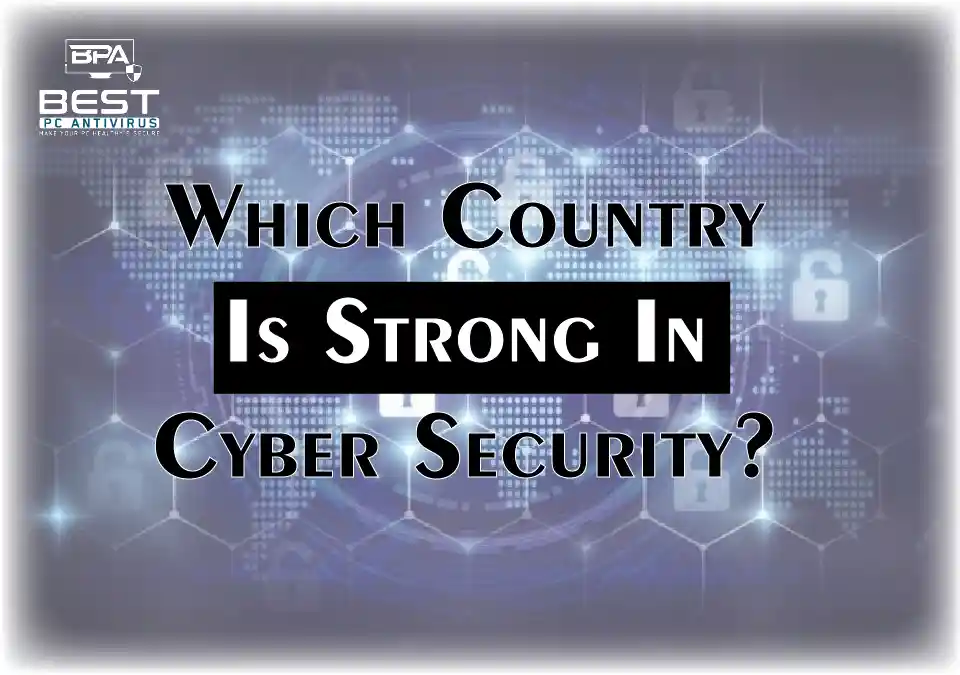Cybersecurity is vital to safeguard sensitive information and prevent cyber threats, which can cause severe financial loss and reputational damage. Factors such as low attack rates, robust defence systems, low infection rates, effective legislation, international cooperation, and public awareness make a country strong in cybersecurity. Israel and the USA are world leaders in cybersecurity due to their highly developed cybersecurity industries, advanced technology, and government support. Let’s learn more about them in detail, in this blog- Which country is strong in cyber security?
What is Cyber Security and Why is Cyber Security Important?
Cybersecurity refers to the practice of protecting computer systems, networks, and sensitive information from unauthorised access, theft, damage, and other cyber threats. With the rapid advancement of technology, cybersecurity has become more important than ever before. It is critical to safeguard both personal and business data, as well as intellectual property, financial information, and other sensitive information. Cyberattacks can have serious consequences, including data breaches, financial loss, identity theft, reputation damage, and even legal liability.
Cybersecurity measures can include using strong passwords, installing antivirus software, regularly updating software and security patches, implementing firewalls, and using encryption to protect data in transit. Cybersecurity professionals are also in high demand, with companies and organisations hiring experts to manage their cybersecurity needs and protect against cyber threats. As technology continues to evolve, so too must cybersecurity measures, to ensure that data remains safe and secure.
What Makes a Country Strong in Cyber Security?
Attack Rates
One important factor that makes a country strong in cyber security is its ability to prevent cyber attacks. A country with a low rate of successful cyber attacks indicates that it has a strong defence system and is effectively managing cyber threats. This can be achieved through various means such as implementing strong cyber security policies, investing in cutting-edge technologies, and employing skilled cyber security professionals.
Defence System
Another crucial factor is having a strong defence system to quickly detect and respond to cyber attacks. This includes measures such as implementing firewalls, intrusion detection and prevention systems, and antivirus software. A robust defence system can also include the use of artificial intelligence and machine learning algorithms to detect and mitigate threats in real-time.
Infection Rates
The infection rate of a country’s networks and systems is also an important factor in determining its strength in cyber security. A high rate of infection can indicate vulnerabilities in a country’s infrastructure, which can be exploited by cyber criminals. In contrast, a low infection rate suggests that a country has taken measures to secure its networks and systems.
Legislation
Legislation is also an important factor in making a country strong in cybersecurity. Governments can enact laws and regulations that promote safe and secure online practices, and hold individuals and organisations accountable for their actions in cyberspace.
These laws can cover a range of issues, from data protection and privacy to cybercrime and national security. They can also establish frameworks for incident response and information sharing among government agencies, as well as with private sector entities.
For example, the European Union’s General Data Protection Regulation (GDPR) is a set of regulations that harmonises data protection laws across member states and sets high standards for the protection of personal data. Similarly, the United States has laws such as the Cybersecurity Information Sharing Act (CISA) and the Computer Fraud and Abuse Act (CFAA) that aim to combat cybercrime and promote cybersecurity.
Effective legislation is important for creating a legal framework that can deter malicious actors and provide incentives for individuals and organisations to adopt good cybersecurity practices. It can also help to build trust and confidence in digital technologies and the online ecosystem, which is critical for the growth of the digital economy and society as a whole
International Cooperation
In today’s interconnected world, cyber security is a global issue that requires international cooperation. Countries that actively participate in international efforts to combat cyber threats, such as sharing information on cyber attacks, coordinating responses, and establishing global cyber security standards, are generally considered stronger in cyber security.
Public Awareness
Finally, public awareness is an important factor in building a strong cyber security culture. When citizens are aware of the risks of cyber attacks and the steps they can take to protect themselves, they become more vigilant and less likely to fall victim to cyber attacks. Governments can promote public awareness through education campaigns, training programs, and other initiatives aimed at raising awareness about cyber security risks and best practices.
Israel
Israel is widely recognized as one of the world’s leaders in cybersecurity. The country has a highly developed cybersecurity industry, with a significant number of cybersecurity companies and startups, as well as a highly skilled workforce. In 2020, Israel had over 450 cybersecurity companies, generating over $6 billion in revenue annually, making it a major player in the global cybersecurity market.
One of the reasons for Israel’s success in cybersecurity is its history of conflict and the need for advanced technology in the military sector. This has led to the development of sophisticated cybersecurity technology and expertise that has been applied in the commercial sector as well. In addition, the Israeli government has placed a high priority on cybersecurity, with significant investment in the field and the establishment of the Israel National Cyber Directorate (INCD) in 2011 to coordinate the country’s cybersecurity efforts.
The INCD has been successful in developing a comprehensive national cybersecurity strategy, which includes the protection of critical infrastructure, strengthening of information security in the public sector, and enhancing cooperation between the government, industry, and academia. The INCD also runs various cybersecurity programs, such as the National Cyber Education Center and the Cyber Gym, which provide cybersecurity training and exercises for businesses and individuals.
Israel’s cybersecurity capabilities have been put to the test in recent years, with the country experiencing a high number of cyberattacks, particularly from neighboring countries and non-state actors. However, Israel has been able to fend off many of these attacks due to its advanced cybersecurity technology and expertise.
Israel’s highly developed cybersecurity industry, significant government investment and support, and a comprehensive national cybersecurity strategy have contributed to the country’s status as a world leader in cybersecurity.
USA
The United States is widely recognized as a leader in cybersecurity due to its highly developed technology sector, advanced research and development capabilities, and strong cybersecurity infrastructure. The country is home to many of the world’s largest technology companies, such as Apple, Google, and Microsoft, which have invested heavily in cybersecurity research and development. In 2020, the U.S. cybersecurity market size was valued at $63.1 billion, with an expected growth rate of 10.0% from 2021 to 2028.
The U.S. government has also made significant investments in cybersecurity, including the establishment of agencies such as the National Security Agency (NSA) and the Department of Homeland Security (DHS) to oversee cybersecurity efforts. The NSA is responsible for monitoring and securing the U.S. government’s computer networks, while the DHS is responsible for securing the country’s critical infrastructure and coordinating cybersecurity efforts with other government agencies.
The U.S. government has also taken steps to enhance cybersecurity through legislation, such as the Cybersecurity Information Sharing Act (CISA) and the Federal Information Security Modernization Act (FISMA). These laws require government agencies and private companies to take specific cybersecurity measures and to report data breaches to the government.
However, the United States faces significant cybersecurity challenges, including frequent cyber attacks on government agencies and businesses. In 2020, the U.S. saw a 50% increase in cyber attacks compared to the previous year, with a total of 1.4 billion data records compromised. In response, the U.S. government has continued to invest in cybersecurity and has taken steps to increase public awareness of cybersecurity threats.
Estonia
Estonia is a small country in Northern Europe with a population of around 1.3 million people. Despite its size, Estonia has gained a reputation as a leader in cybersecurity. Estonia’s investment in digital technology has been a significant factor in its success in cybersecurity. The country has a highly digitised society, with around 99% of its population having access to the internet. Estonia has also embraced the use of technology in its public services, such as online voting, online tax filing, and online healthcare services.
Estonia has invested heavily in cybersecurity and has developed an advanced cybersecurity infrastructure. The Estonian government has established the Estonian Information System Authority (RIA) to oversee cybersecurity efforts. The RIA is responsible for monitoring Estonia’s critical information infrastructure and coordinating cybersecurity activities between public and private organizations.
In addition to the RIA, Estonia has established the Estonian Defence Forces Cyber Command (EDFCC) to defend against cyber threats. The EDFCC is responsible for conducting cybersecurity operations, developing cybersecurity capabilities, and providing cybersecurity training.
Estonia has also been at the forefront of international efforts to improve cybersecurity. The country played a key role in the development of the European Union’s (EU) Network and Information Security (NIS) Directive, which aims to strengthen cybersecurity across the EU. Estonia has also been active in NATO’s Cooperative Cyber Defence Centre of Excellence (CCDCOE), which provides training and research on cybersecurity to NATO members and partner countries.
Singapore
Singapore is known for its strong economy and advanced technology industry, which has contributed to its focus on cybersecurity. The country has made significant investments in its cybersecurity infrastructure, including the establishment of the Cyber Security Agency of Singapore (CSA) in 2015 to oversee and coordinate the country’s cybersecurity efforts. The CSA is responsible for creating and implementing national-level cybersecurity strategies and programs, as well as promoting public-private partnerships to improve cybersecurity.
In addition to government initiatives, Singapore has also invested heavily in developing its cybersecurity industry, with a focus on developing a skilled workforce and fostering innovation. The country is home to a number of cybersecurity companies and research institutions, including the Cyber Security Research Institute (CSRI) and the Singapore Cybersecurity Consortium.
To promote cybersecurity awareness and education, the government has established a number of initiatives, including the National Cybersecurity Awareness Campaign and the Cyber Security Associates and Technologists (CSAT) program. These programs aim to increase public awareness of cybersecurity risks and best practices, as well as provide training and education for cybersecurity professionals.
According to the Global Cybersecurity Index (GCI) 2020, Singapore ranked third globally in terms of cybersecurity readiness, behind only the United States and the United Kingdom. The country also scored high in the areas of legal frameworks, technical capacity, and organizational capacity, reflecting its strong government support and investment in cybersecurity.
FAQs
What Makes a Country Strong in Cyber Security?
Factors that make a country strong in cybersecurity include a low rate of successful cyber attacks, a strong defence system, a low infection rate, effective legislation, international cooperation, and public awareness.
Why is Israel strong in cybersecurity?
Israel has a highly developed cybersecurity industry, a history of conflict and need for advanced technology in the military sector, significant government investment and support, and a comprehensive national cybersecurity strategy.
Which country is a leader in technology and cybersecurity?
The United States is widely recognized as a leader in technology and cybersecurity due to its highly developed technology sector, advanced research and development capabilities, and strong cybersecurity infrastructure.
What is the European Union’s General Data Protection Regulation (GDPR)?
The GDPR is a set of regulations that harmonises data protection laws across member states and sets high standards for the protection of personal data.
What are some cybersecurity measures that can be taken to protect data?
Cybersecurity measures that can be taken to protect data include using strong passwords, installing antivirus software, regularly updating software and security patches, implementing firewalls, and using encryption to protect data in transit.
Read More : Define F-secure Antivirus? Features & Benefits of using F-secure?




